Who Studied Food Systems with CLF?
MPH Concentration in Food Systems
Christina LiPuma
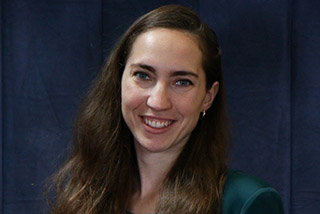 MPH Concentration in Food Systems, 2023
MPH Concentration in Food Systems, 2023
Graduate: Johns Hopkins Bloomberg School of Public Health, MPH
Professional training: dietetic internship at Brigham and Women’s Hospital
Undergraduate: Syracuse University, Dietetics, BS
Hometown: West Windsor, New Jersey
LinkedIn
Christina LiPuma’s first job was working on a small farm in New Jersey, where she picked berries and other fresh market produce. After earning her credential as a registered dietitian, she provided one-on-one medical nutrition therapy to Medicaid patients. "In this setting, I quickly learned the detrimental effect that lack of resources could have on a person's ability to make changes to their diet and lifestyle. Many of my patients were highly motivated but lacked the resources they needed to be successful in improving their health, such as access to affordable, healthy food in their neighborhood or safe places to exercise. This led me to pursue the food systems concentration in hopes of addressing diet and health using a systems approach," Christina says. She works in Burlington, Vermont, as a Policy Associate at the Center for Science in the Public Interest.
"My experience at BSPH gave me the tools necessary to move my career from the level of helping the individual make a dietary change to working to change the broader context of the food system that impacts an individual's food choices.” —Christina LiPuma
Emily Hennessee
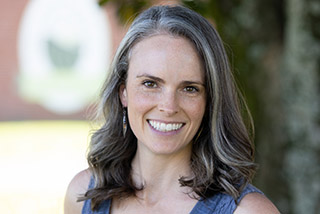 MPH Concentration in Food Systems, 2019
MPH Concentration in Food Systems, 2019
Graduate: Johns Hopkins Bloomberg School of Public Health, MPH
Undergraduate: Emory University, Cultural Anthropology, BA
Hometown: Des Moines, Iowa
LinkedIn
After graduating from Emory University with a BA in Cultural Anthropology and a minor in Global Health, Emily Hennessee decided to continue her education at Johns Hopkins. She wanted to explore the innovative work at the Center for a Livable Future and public health from a food systems lens. "I chose to study food systems because I wanted to gain a deeper understanding of the connections between food systems and other aspects of our society and how I could be a changemaker to improve our food system," Emily says. Before her time at the Bloomberg School of Public Health, she never learned much about the impact of seafood on public health and the environment. Emily uses what she learned in classes and at CLF in her current position as Project Manager for the Georgia ACRE Collection, The Common Market Southeast.
"I had the opportunity to work as a research assistant on CLF’s project about waste throughout the seafood supply chain…. I was shocked to learn about the complex supply chains that make up the global food seafood industry and the challenge of researching these supply chains.” —Emily Hennessee
Lisa Mariko Weltzien
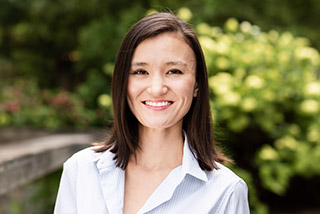 MPH Concentration in Food Systems, 2022
MPH Concentration in Food Systems, 2022
Graduate: University of Pennsylvania School of Veterinary Medicine, VMD
Johns Hopkins Bloomberg School of Public Health, MPH
Undergraduate: Middlebury College, Molecular Biology and Biochemistry
Hometown: Kumamoto, Japan
LinkedIn
With a veterinary degree from PennVet, Lisa wanted to broaden her skills to better advocate for livestock. Outbreaks such as swine flu, MERS, and avian flu unfortunately result in the mass culling of farmed animals and animals sold in wildlife markets, and when the COVID-19 pandemic wreaked a similar havoc, she was inspired to learn more about the food animal supply chain. She knew that an MPH from the Bloomberg School would help her understand the role of food animals in the context of the larger food system and how to advocate for good husbandry practices, cautious antimicrobial use, and improved welfare. At the Bloomberg School, she learned the complexity of food systems and how important it is to embrace that complexity. In 2022, Lisa moved to Munich, Germany, to work on animal and public health projects as a consultant for the Food and Agriculture Organization of the United Nations, and in 2023, CLF published Lisa's MPH capstone on the shortage of food animal veterinarians in the United States.
“I came into the program wanting very clear-cut answers and step-wise solutions, but many of the issues are complex and progress takes time. The food systems courses taught me that it's important to embrace this complexity, stay true to your core beliefs and values, and be persistent.” —Lisa Mariko Weltzien
Brianna Bradley
MPH Concentration in Food Systems, 2021
Graduate: Johns Hopkins Bloomberg School of Public Health, MPH
Undergraduate: University of California, Davis, Clinical Nutrition
Hometown: Orlando, Florida
LinkedIn
While an undergraduate, Brianna studied clinical nutrition, but felt herself pulled toward public health. She began her career after college by researching the impact of fisheries and aquaculture on women’s and children’s nutrition, and this experience further opened her eyes to how nutritional health connects so deeply to our local and agricultural environments and cultures. Having also worked in food service and culinary arts, she knew that she wanted her master’s degree in public health at the Bloomberg School to focus on food systems. When she took the Baltimore Urban Food Systems course, she further recognized how the real-life dynamics that affect local food access and insecurity tie into what she’d learned in public health and policy courses.
"One change I hope to see in 10 years is for the most historically disadvantaged communities to be heard for how they want to receive economic, educational, and health support in moving towards a future without health disparities." —Brianna Bradley
Abby Reich
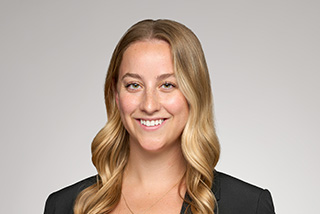 MPH Concentration in Food Systems, 2018
MPH Concentration in Food Systems, 2018
Graduate: Johns Hopkins Bloomberg School of Public Health
Undergraduate: Connecticut College, Environmental Science and Dance
Hometown: Greater Boston, MA
LinkedIn
Abby began her formal education studying both dance and environmental science, a combination that situated her at the intersection of creativity, human health, and our environment. Building on previous learnings in wildlife conservation in Kenya and Tanzania, she started to understand the connections between agriculture and community health. Her interests led her to a career in nutrition education and media, and then to the Johns Hopkins School of Public Health, where she earned her degree in 2018, with a Concentration in Food Systems. Prioritizing positive transformation for climate change and food systems, Abby is currently living in Baltimore, Maryland, and working as the Knowledge Mobilisation Manager for EatSafe at the Global Alliance for Improved Nutrition (GAIN).
“While at Hopkins, Dr. Keith West advised me that when working in food systems and/or public health, it's important to get comfortable with not seeing quick changes. Especially in food systems, change can take decades. With that advice, I hope in 10 years time, safe, nutritious food can be universally accepted as a basic human right.” —Abby Reich
Certificate in Food Systems, the Environment and Public Health
Kelsey Crawford
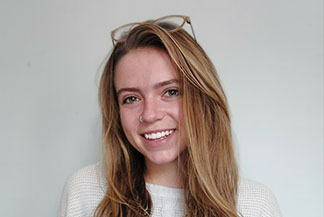 Certificate in Food Systems, the Environment and Public Health, 2024
Certificate in Food Systems, the Environment and Public Health, 2024
Graduate: Johns Hopkins Bloomberg School of Public Health, MPH
Undergraduate: Florida Southern College, Psychology, BS
Hometown: Hamersville, Ohio
LinkedIn
While working at Tumbling Shoals Farm in Wilkes County, North Carolina, Kelsey Crawford felt that owners Shiloh Avery and Jason Roehrig were doing all the right things—including paying and supporting workers well, donating time and food to our community, engaging in advocacy and strengthening our food systems, making the farm as efficient as possible. And yet they still struggled to make farming work. “I felt like it was necessary I learn about ways to strengthen our regional food system, especially for small and medium sized farms,” Kelsey says. When she enrolled in the Bloomberg School of Public Health, she found a home at the Center for a Livable Future after Phil McNab connected her to Dr. Patti Truant Anderson, who became her capstone advisor. “She and I developed a Policy and Practice Brief of the 2019 New Swine Inspection System, where we analyzed the impact of increased line speeds on swine processing worker safety and wellbeing. When we presented this, we were met with so much enthusiasm and ideas, and we are in the process of publishing our work,” Kelsey says. Now, Kelsey works as the Marketing, Harvest, and Packing Shed Manager at Tumbling Shoals Farm.
Read Kelsey's capstone: Policy and practice brief on the 2019 New Swine Inspection System, line speeds, and workers
“I want to keep farming forever, and because of BSPH and the CLF, I feel like I have the connections and resources to be more effective in the field.” —Kelsey Crawford
Alexis N. Peña
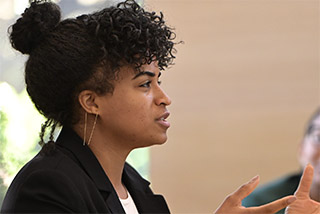 Certificate in Food Systems, the Environment and Public Health, 2021
Certificate in Food Systems, the Environment and Public Health, 2021
Graduate: Johns Hopkins School of Medicine, Whiting School of Engineering, Biomedical Engineering, PhD
Undergraduate: Syracuse University, Bioengineering
Hometown: Durham, North Carolina
LinkedIn
Alexis is a biomedical engineer building a career in healthcare technology and biomaterial innovation, who has also spent time as a volunteer at the Big Horn Basin of Wyoming, 70 miles from Yellowstone National Park, living on a certified organic farm that uses solar power for operations. Informing all of her career goals is a desire to improve health outcomes and quality of life, a “north star” that inspired her to complete a graduate certificate from Bloomberg's School of Public Health in Food Systems, the Environment, and Public Health. For part of the graduate certificate requirements she completed a service-learning project for a Food Systems Practicum course and volunteered at a nonprofit called the Bit Center that serves the Greenmount/York Road community in Baltimore. She supported their K-5 nutritional food instructional course called “Be a Chef for a Day” by creating nutritional education content. In 2023, she participated in an event series called "A Taste of Black Freedom: Black Foodways in Baltimore and Beyond," co-sponsored by The Center For Africana Studies, The Program In Racism, Immigration, And Citizenship, and The Alexander Grass Humanities Institute, and she worked with the Alternative Protein Project to write a review with former CLF director Martin Bloem about alternative protein solutions and environmental impacts.
“With the globalized, complex, and dynamic food system, there was a lot to learn. As an innovator, understanding the food system processes, challenges, and stakeholders helps me ideate solutions.” —Alexis N. Peña
Audrey Tran Lam
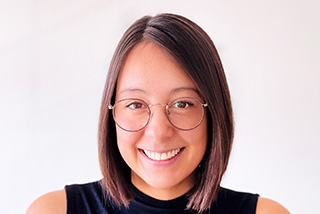 Certificate in Food Systems, the Environment and Public Health, 2021
Certificate in Food Systems, the Environment and Public Health, 2021
Graduate: University of Iowa, College of Public Health / Occupational and Environmental Health
Undergraduate: Luther College, Iowa, Environmental Studies and Sociology
Hometown: Vinton, Iowa
LinkedIn
After graduating from Luther College, Audrey wanted to participate in climate change solutions. Her work on an organic farm helped her realize that there are a lot of dots to connect—land use, climate, nutrition, food access, to name a few—and that it all came back to public health. While attending an APHA conference at which CLF’s founding director spoke, Audrey realized that the Center for a Livable Future was making food system connections that she hadn’t been able to articulate, and she began thinking about the food system in a new way. Her investigations into the Center led her to apply for the Certificate Program in Food Systems, the Environment and Public Health. Determined to make real, positive change in the Midwest, she is currently the Environmental Health Program Director at the Center for Energy & Environmental Education at the University of Northern Iowa, and she serves on several organizations, including the Iowa Rural Health Association, the Iowa Food Systems Coalition, the Heartland Health Research Alliance, and the Pesticide Action Network.
“I suddenly saw the food system as one problem, repeated over and over: fewer players, less diversity. Fewer famers, bigger farms. Fewer crops, higher yields.” —Audrey Tran Lam
Ilana Moreno
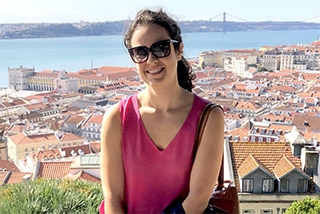 Certificate in Food Systems, the Environment and Public Health, 2021
Certificate in Food Systems, the Environment and Public Health, 2021
Graduate: Johns Hopkins Bloomberg School of Public Health, MSPH
Undergraduate: Washington University, BFA in Fashion Design
Hometown: Washington, DC
LinkedIn
With a degree in fashion and work experience in events, marketing, and operations, Ilana took time during the COVID-19 pandemic to explore what really mattered to her professionally. That’s when she learned that it was possible to build a career in food systems, and that the Bloomberg School offered a certificate in the subject. The concept of food systems being a “wicked problem” resonated with her, and her coursework clicked. With so many interconnections in the food web, she learned, solving one problem could inadvertently create new problems. In her career, she aims to use a multi-disciplinary approach to tackle climate change and to work toward policies that incentivize healthy soils, diverse ecosystems, and a variety of affordable and nutritious crops.
“The Bloomberg School constantly challenged me to consider all the angles and perspectives to a problem … . The professors really emphasized the importance of the ‘systems’ lens and the various social, economic, political, environmental, and cultural layers that need to be considered when tackling any challenge.” —Ilana Moreno
Anne Rosenthal
Certificate in Food Systems, the Environment and Public Health, 2018
Graduate: Johns Hopkins Bloomberg School of Public Health
Undergraduate: Wesleyan University, Environmental Studies and French
Hometown: Baltimore, MD
LinkedIn
After college, Anne gained work experience in a number of fields, from supporting community health workers in rural Mexico, to researching sustainability in Belgium, to building communications tools for global health initiatives in New York. Connecting these diverse experiences was an interest in equity—she was keenly interested in helping to further equal access to food, health care, information, and opportunity. While earning her MPH degree, she focused on health systems and policy and enrolled in the Food Systems Certificate Program. Her current work continues to focus on equity, as she focuses on school meals and food education in the Baltimore City Public School System as Food & Nutrition Specialist.
“What gives me hope is hearing elementary students from Baltimore City Public Schools chant “BROC-CO-LI! BROC-CO-LI!” during local farm field trips and watching them dig into gardens at their schools.” —Anne Rosenthal